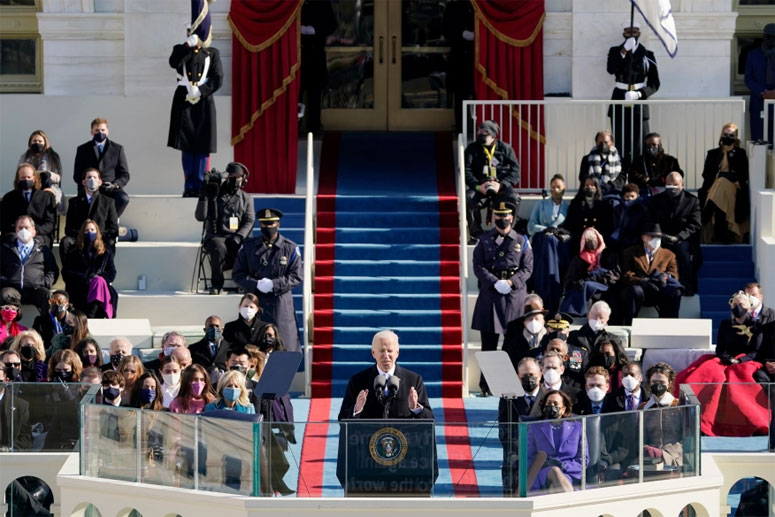Poets and politicians
Nobody expected a 22-year-old poet named Amanda Gorman to be the runaway hit at Joe Biden’s presidential inauguration last month, but there she was, bright and exuberant, delivering a clear and ringing message of hope in her now-famous “The Hill We Climb.”
Once you have both grandmothers and teenagers quoting the same verses in their posts, you know that a chord has been struck, a nerve touched, in the national psyche.
Of course, that was another nation, not ours, but I’m sure many Filipinos exulted as well in that new beginning for America after four years of chaos, and not too secretly hoped for a similar return to civility and decency — indeed to optimism and intelligence — where they were.
As a boy whose early education was steeped in Americana — nothing too strange in Filipino private schools of the 1960s — I grew up to become something of a junkie for American history and politics, which explains why, for the past three months, I followed every turn of the Trump-Biden saga as if it had anything to do with us (and inevitably, it will; when America burps or worse, we hear it).
There have just been four American presidents who had poets read at their inaugurals: John F. Kennedy in 1961, Bill Clinton in 1993 and 1997, Barack Obama in 2009 and 2013, and Joe Biden in 2021. Robert Frost read “A Gift Outright” for JFK; for Clinton, Maya Angelou read “On the Pulse of Morning” in 1993 and Miller Williams read “Of History and Hope” in 1997; for Obama’s first inauguration in 2009, Elizabeth Alexander read “Praise Song for the Day” and in 2013, Richard Blanco read “One Today.” (Many thanks to poets.org for the information.)
Once you have both grandmothers and teenagers quoting the same verses in their posts, you know that a chord has been struck, a nerve touched, in the national psyche.

As you can see from the titles alone, these poems were flush with positivity, as inaugurals should be. Why only Democrats brought poets along to their inaugurals seems something of a mystery — but then again maybe not, as poetry and the brand of culture it implies could be seen as “soft” by the gun-toting machos who typically vote Republican.
There’s an article in the Chicago Tribune from 2012, when Mitt Romney was challenging Obama for the presidency, that faulted Romney for his rhetorical gaffes and asked if he could use a poet at his side. (Among his critics was a guy named Donald Trump who called Romney’s language “inartful.”)
The Tribune noted that while “the world of poetry… is a liberal tradition,” there was also a smaller category of politically conservative poets — T. S. Eliot and Samuel Coleridge among them — that was still current, and had even been anthologized into a book called, unsurprisingly, The Conservative Poets, published by the University of Evansville Press in 2006. None of these featured poets made it to Trump’s inaugural in 2016.
Surely there must be parallels in our own political history — we even had a president, Carlos P. Garcia, who wrote poems called balak in his native Boholano, and Ferdinand Marcos retained a coterie of Palace poets to sing his and Meldy’s praises. These deserve longer commentary for another time.
Poetry’s appeal to the emotions requires a certain sensitivity on the listener’s or reader’s part, but it also engages the mind in ways that force you to go beyond the literal and to make intuitive connections between this and that.
Even as I admire Amanda Gorman’s achievement, and especially her delivery, I do have to say that, as a poem, “The Hill We Climb” was far from perfect for me—not that it matters much in the context of what the poem had to do. In modern poetry, we usually suggest that the poem be less direct, less declarative about its intentions, leaving the reader with a little puzzle to figure out.
It’s the difference between saying “Nobody loves me like you do” and e. e. cummings writing “Nobody, not even the rain, has such small hands.”
But Amanda was engaged in what we might call public poetry, poetry meant to be almost immediately understood and appreciated by a live audience, so it had to be more obvious in its meaning. That’s why it worked, like a popular song whose refrain people can easily remember; note, too, the rap-like rhyming and rhythm of its lines.
What’s important is that the poem connected and made sense of recent events in a way and on a level that news stories and editorials couldn’t, delivered by a young, black poet with a credibility that politicians could only dream of.
Speaking of politicians, I’ve long maintained that leaders incapable of tenderness and of acknowledging their vulnerability can’t be trusted.
Poetry’s appeal to the emotions requires a certain sensitivity on the listener’s or reader’s part, but it also engages the mind in ways that force you to go beyond the literal and to make intuitive connections between this and that. Leaders shackled by their own simplistic “us vs. them” mindsets and their self-defensiveness can’t make those imaginative leaps, or appreciate the rich ambiguities of literature, stuck in their rigid dogmas.
This doesn’t mean that culturally literate leaders can’t be tough when they need to be; JFK stood up to Khrushchev and the Soviets with a naval blockade when they tried to ship missiles to Cuba. We can only wish other national leaders would be so brave against their nations’ enemies, instead of picking on certain universities for letting their professors and students think and speak freely, which not incidentally are basic to the writing of great poetry.
Banner and thumbnail caption: Amanda Gorman recites at the Jan. 20, 2021 inauguration of US President Joseph Biden. AP photo


